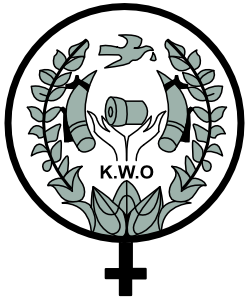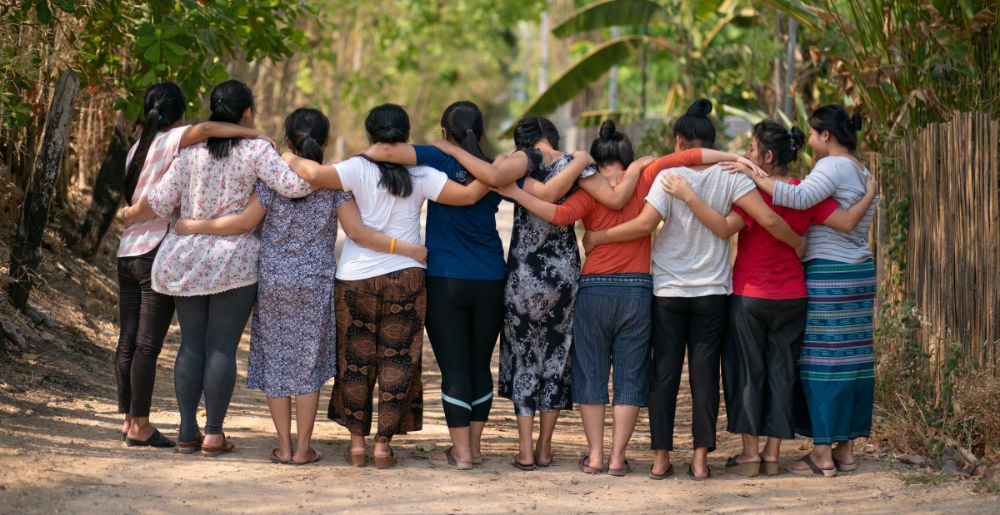[scribd id=260846604 key=key-4qhMoB660SYR5G6ig7zc mode=scroll] As KWO first reported in 2010, in lowland Karen areas in Eastern Burma Karen women are more and more becoming chiefs, as people have hoped they will not be killed by the Burmese Army like some male chiefs. This is a big change in our traditions and has made women more visible and vulnerable to human rights abuses by the Burmese Army. It also means that women have become leaders when our community has most needed it. Many women stood up and faced the Burmese Army directly representing and working for our people. These women leaders are now experienced leaders of our community with knowledge about how their community works and how to deal with the Burmese Army effectively. It is one more reason we have earned a role in the peace process. In 2010 KWO released a report, Walking Among Sharp Knives, after interviewing 95 women village chiefs. They told KWO they saw or had done to them the following by the Burmese Army:
- Crucifixion
- People burnt alive
- Rape, including gang rape
- Many forms of torture, including beatings and “water torture”
- People buried up to their heads in earth and beaten to death
- Arbitrary executions
- Beheadings
Slave labour Many of these things are violations of International law. Women have more and more often been elected as village chiefs in lowland areas since the 1980’s as the Burmese Army has been in our areas more and more and there has been more violence against the Karen. Men have not wanted to be killed for taking the responsibility of being chief. Women have stepped in hoping the Army would not be so violent against them. However, women chiefs have told us that, far from being safe from the Burma Army, they have faced ongoing abuse, including abuse because they are women. These interviews were with women chiefs from five districts of Eastern Burma: Papun (Mutraw), Dooplaya, Thaton (Doo Tha Htu), Nyaunglebin (Kler Lwee Htu), and Pa-an. They are aged from 25 to 82. The average length of time they served as chiefs was nine years; about one third of the women were still serving as chiefs when they were interviewed. The women chiefs not only describe their daily work to meet the constant demands of the Burma Army for labour, food, building materials, “taxes” and intelligence, but also talked about to the Army’s use of terror tactics against villagers to get them to do what they wanted and to stop them from helping the Karen resistance. These women chiefs saw many times villagers being abused and murdered. They also have suffered very bad punishment for not helping the Burmese Army. One third of the women interviewed had been beaten or tortured. The women also experienced or saw sexual violence. They describe gang-rape, rape of girl-children and rape-murder for which they were unable to seek help or have the person who did it punished. They also describe being forced to provide “comfort women” for the Burma Army troops. The women chiefs’ have also been threatened with violence as women in order to make them afraid. Women chiefs said rape of women chiefs was common, and several chiefs described being gang-raped. Pregnant and nursing women chiefs were taken to do forced labour and were violently asked questions by the Army for many hours. Despite the constant threat of violence, the women’s stories shows their strength and courage in assuming leadership and trying to protect the rights of their communities. They have repeatedly challenged and complained to Burma Army troops about abuses and in some cases managed to get compensation for the community and even to get changed unjust orders. It is this experience that has prepared these women and others to be leaders in the current peace process. The women chiefs have also suffered great personal stress from being unable to fulfill their traditional household roles and care for their families. Several were blamed by their husbands for being “married to the SPDC” because they had to follow their orders. This report by KWO provides important information about the challenges of women assuming leadership in a militarized society controlled by men. The KWO hopes that this report will help bring recognition of these brave women for their sacrifices not only at the front line of abuse by Burma’s military dictatorship, but at the forefront of the struggle for gender equality in Burma. As militarization of Karen areas continues, with ongoing military offensives by the Burma Army and their allies deliberately targeting civilians north of Karen State, as well as ongoing abuses in areas under the control of the Burma Army in Karen State, the KWO is urgently calling for the following measures:
- That the United Nations Security Council establish a Commission of Inquiry into war crimes and crimes against humanity being committed by the Burmese military dictatorship.
- That the Royal Thai Government grants continued protection to those refugees who have fled military attacks and human rights abuses.
- That the Karen community recognize the role of women as leaders and that the KNU fulfill their policy of 30% representation by appointing women to the teams meeting with the Burmese and negotiating for peace and rights for the Karen people.


